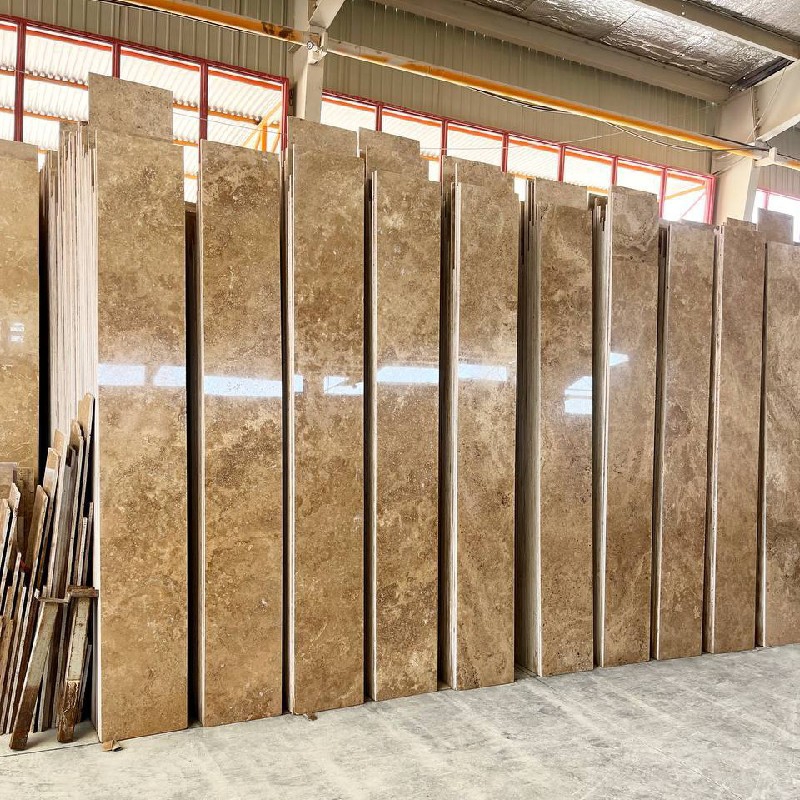
Travertine stone, with its timeless elegance and durable nature, has become a popular choice for homeowners and designers alike. Whether it graces the floors of a sophisticated living room, the walls of a serene bathroom, or the walkways of a lush garden, travertine adds a touch of natural beauty to any space. However, its porous nature requires specific care to maintain its allure over time. This comprehensive guide will explore the most effective methods for cleaning and maintaining travertine stone floors, showers, and outdoor areas, ensuring your travertine surfaces remain pristine and beautiful for years to come.
How to Clean Travertine Stone Floors Travertine stone floors can add a luxurious feel to any interior. To preserve their beauty, it’s crucial to follow a regular cleaning routine. Start by dust mopping your floors frequently to remove dirt and debris that can scratch the surface. When deeper cleaning is needed, use a mild, pH-neutral cleaner specifically designed for natural stone. Avoid acidic cleaners, such as vinegar or lemon juice, as they can etch the stone. For stubborn stains, a poultice made from baking soda and water can be applied directly to the stain, covered with plastic wrap, and left to sit for 24 hours before rinsing with water. Sealing your travertine floors annually with a quality sealer will also protect them from stains and make them easier to clean.
How to Clean Travertine Stone in Shower Travertine in showers offers a spa-like ambiance but requires careful maintenance to combat soap scum and hard water deposits. To clean travertine in the shower, use a soft cloth or sponge and a gentle, non-acidic soap scum remover. For hard water stains, a solution of water and a small amount of ammonia can be effective, but it should be used sparingly to avoid damage to the stone. After cleaning, thoroughly rinse the travertine with clean water and dry it with a soft towel to prevent water spots. Regular sealing is particularly important in the shower environment to prevent water penetration and damage.How to Clean Outdoor Travertine Stone Outdoor travertine stone, used in patios, pathways, and pool surrounds, is exposed to the elements and requires regular cleaning to maintain its appearance. Begin by sweeping the surface to remove loose dirt and leaves. For general cleaning, use a mild detergent mixed with water and a soft brush to gently scrub the surface. Rinse thoroughly with a garden hose. For tougher stains, such as mildew or algae, a solution of bleach and water can be used, but it should be diluted properly to avoid discoloring the stone. As with indoor travertine, sealing outdoor travertine helps protect it from stains and makes it easier to clean.
Q: Can I use a pressure washer to clean outdoor travertine? While a pressure washer can be used on outdoor travertine, it’s important to use a low-pressure setting and a wide nozzle to avoid damaging the stone. Test the pressure washer on an inconspicuous area first to ensure it does not erode the surface of the travertine.
Q: How often should I seal travertine? Travertine should be sealed every one to two years, depending on its location and the amount of foot traffic it receives. Areas with high usage or exposure to water, such as bathrooms and outdoor spaces, may require more frequent sealing.
Q: Are there any natural cleaners I can use on travertine? For daily cleaning, warm water and a microfiber mop are sufficient for travertine floors. For a deeper clean, a mild, pH-neutral dish soap diluted in water can be used. Avoid using natural cleaners that are acidic, such as vinegar or lemon juice, as they can etch the stone.
Conclusion Maintaining the natural beauty of travertine stone requires regular cleaning and care. By following the recommended practices for cleaning travertine stone floors, showers, and outdoor areas, you can ensure that your travertine surfaces remain elegant and durable for years to come. Remember to use gentle, pH-neutral cleaners, avoid acidic substances, and seal the stone regularly to protect against stains and damage. With the right care, your travertine stone will continue to add warmth and sophistication to your home or garden.
Aida Stone Trading is serving its valued customers with the wholesale sale of building stones, including all types of travertine and marble. cnc production and sales of porcelain stones are also performed in this complex. You, the dear and valuable customers of Emerald Trading, can contact our experts in this center to buy bulk stones and benefit from their free advice.